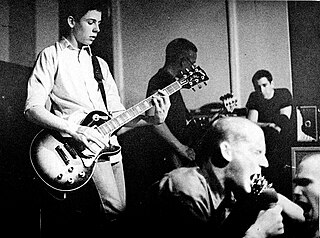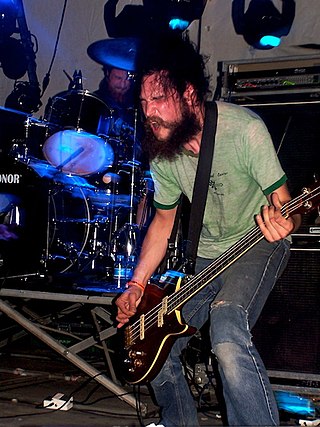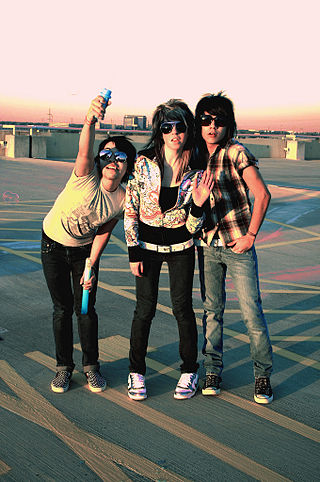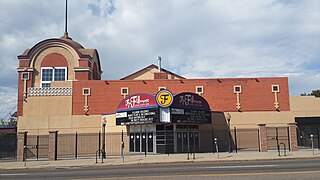
Hardcore punk is a punk rock music genre and subculture that originated in the late 1970s. It is generally faster, harder, and more aggressive than other forms of punk rock. Its roots can be traced to earlier punk scenes in San Francisco and Southern California which arose as a reaction against the still predominant hippie cultural climate of the time. It was also inspired by Washington D.C. and New York punk rock and early proto-punk. Hardcore punk generally disavows commercialism, the established music industry and "anything similar to the characteristics of mainstream rock" and often addresses social and political topics with "confrontational, politically-charged lyrics."
Emo is a rock music genre characterized by emotional, often confessional lyrics. It emerged as a style of post-hardcore and hardcore punk from the mid-1980s Washington D.C. hardcore punk scene, where it was known as emotional hardcore or emocore and pioneered by bands such as Rites of Spring and Embrace. In the early–mid 1990s, emo was adopted and reinvented by alternative rock, indie rock and/or punk rock bands such as Sunny Day Real Estate, Jawbreaker, Cap'n Jazz, and Jimmy Eat World. By the mid-1990s, bands such as Braid, the Promise Ring, and the Get Up Kids emerged from the burgeoning Midwest emo scene, and several independent record labels began to specialize in the genre. Meanwhile, screamo, a more aggressive style of emo using screamed vocals, also emerged, pioneered by the San Diego bands Heroin and Antioch Arrow. Screamo achieved mainstream success in the 2000s with bands like Hawthorne Heights, Silverstein, Story of the Year, Thursday, the Used, and Underoath.
Vagrant Records is an American record label based in California. It was founded in 1995 by Rich Egan and Jon Cohen. The label focuses on rock, but features artists in a variety of other genres including folk, soul, electronic, and pop. It is home to artists such as The 1975, Death Spells, Eels, Edward Sharpe and the Magnetic Zeroes, CRUISR, Active Child, PJ Harvey, School of Seven Bells, Black Rebel Motorcycle Club, James Vincent McMorrow, Black Joe Lewis, Wake Owl, Blitzen Trapper, and Bombay Bicycle Club. Originally, Vagrant Records was mostly focused on emo bands such as Dashboard Confessional, Saves the Day, The Get Up Kids, Senses Fail, and Alkaline Trio. The label is considered one of the pre-eminent labels of the emo music scene.
Post-hardcore is a punk rock music genre that maintains the aggression and intensity of hardcore punk but emphasizes a greater degree of creative expression. It was initially inspired by post-punk and noise rock. Like post-punk, the term has been applied to a broad constellation of groups. Post-hardcore began in the 1980s with bands like Hüsker Dü and Minutemen. The genre expanded in the 1980s and 1990s with releases by bands from cities that had established hardcore scenes, such as Fugazi from Washington, D.C. as well as groups such as Big Black and Jawbox that stuck closer to post-hardcore's noise rock roots. In the early- and mid-2000s, post-hardcore achieved mainstream success with the popularity of bands like My Chemical Romance, Dance Gavin Dance, AFI, Underoath, Hawthorne Heights, Silverstein, The Used, At the Drive-In, Saosin, Alexisonfire, and Senses Fail. In the 2010s, bands like Sleeping with Sirens and Pierce the Veil achieved mainstream success. Meanwhile, bands like Title Fight and La Dispute experienced underground popularity.

Blood for Blood is an American hardcore punk band from Boston, Massachusetts. It was formed in 1994 by Erick "Buddha" Medina and "White Trash" Rob Lind, drawing inspiration from the hardcore scene in Boston and New York. In 1997, they were signed to Victory Records. The band describes its sound as influenced by Sheer Terror, Breakdown, Carnivore and Killing Time.
The American state of Colorado has many music scenes and venues, especially in the larger cities like Denver and Colorado Springs.

Midtown is an American pop punk band from New Brunswick, New Jersey, United States. Midtown was formed in November 1998 by three Rutgers University students, but quickly became a quartet. The group released three full-length studio albums and three extended plays before disbanding in 2005. In early 2014, Midtown reunited to play three shows, the first as a secret show at The Knitting Factory in Brooklyn, and the two remaining at the Skate And Surf Festival. They reunited for more shows in 2022 as openers on My Chemical Romance's reunion tour.

Melodic hardcore is a broadly defined subgenre of hardcore punk with a strong emphasis on melody in its guitar work. It generally incorporates fast rhythms, melodic and often distorted guitar riffs, and vocal styles tending towards shouting and screaming. Nevertheless, the genre has been very diverse, with different bands showcasing very different styles. Many pioneering melodic hardcore bands, have proven influential across the spectrum of punk rock, as well as rock music more generally. The term "melodic punk" is often used to describe both melodic hardcore and skate punk bands.

Planes Mistaken for Stars is an American rock band formed in Peoria, Illinois in 1997. Working with several different labels, they released three studio albums and four EPs before breaking up in 2008. While rooted in the post-hardcore and emo scenes of the turn of the century, Planes Mistaken for Stars developed a distinctive musical style strongly influenced by heavy metal and rock and roll. Reuniting for live performances in 2010, they went on to release their fourth album Prey in 2016.

Articles of Faith was a Chicago-based hardcore punk band originally active between 1981 and 1985. The band's later work is credited with superior songwriting and with foreshadowing the emo sound. Originally a Springsteen/Clash cover band called Direct Drive, the group changed both its music and name after frontman Vic Bondi visited Washington, D.C. in 1981 and saw a Bad Brains show that he describes as an “epiphany.” AoF typically showed funk, reggae and jazz influences, accompanied by lyrics bemoaning the difficulty of finding freedom and fulfillment in consumer society. While the band's influence was blunted by being based in Chicago, it maintained close musical and thematic ties to the Washington DC / Dischord Records scene. Drummer Bill Richman, a member of the Revolutionary Communist Party briefly left the band in 1984 due to the waning of the band's political emphasis; he returned later to record In This Life. Bondi had already left Chicago by the time AoF disbanded in 1985; In This Life was issued two years later. The original lineup reunited for a European tour in 1991. The final show of this tour was recorded and issued as part of the Your Choice Live series.

Bad Scene, Everyone's Fault is a tribute album to the band Jawbreaker, released in 2003 by Dying Wish Records. It includes bands of the post-hardcore, punk rock, pop punk, and emo genres covering Jawbreaker songs. The album is named after a song on Jawbreaker's 1995 album Dear You.

While Denver may not be as recognized for historical musical prominence like such cities as Los Angeles, Detroit, Chicago or New York City, it still manages to have a very active popular, jazz, and classical music scene, which has nurtured many artists and genres to regional, national, and even international attention. Though nearby Boulder, Colorado has its own very distinct music scene, they are intertwined and often artists based there also play in Denver.

Mark Brooks is an American producer, director, writer and musician known for his work on projects such as Metalocalypse, Moonbeam City and Serenity. He is a member of the dark electronic pop group Night Club.

The scene subculture is a youth subculture that emerged during the early 2000s in the United States from the pre-existing emo subculture. The subculture became popular with adolescents from the mid-2000s to early 2010s. Members of the scene subculture are referred to as scene kids, trendies, or scenesters. Scene fashion consists of skinny jeans, bright colored clothing, a signature hairstyle consisting of straight, flat hair with long fringes covering their forehead, and bright colored hair dye. Music genres associated with the scene subculture include metalcore, crunkcore, deathcore, electronic music, and pop punk.
Little Fyodor is the performance name of Dave Lichtenberg, an underground punk/garage musician from Denver, Colorado, who has been on the scene for two decades. He originally performed in the band Walls of Genius, and then went on to become a solo act. He is also known as a public radio DJ, and a reviewer of self-published music.

The Fillmore Auditorium is a concert venue located in the Capitol Hill neighborhood in Denver, Colorado. Since opening in 1907, the venue has hosted numerous functions both private and public. It holds the title of the largest indoor venue for general admission seating in Colorado. The venue also holds an exclusive dual Minors with Adults Liquor License in Colorado for a private venue; it allows minors and consumers over 21 to stand together, rather than having to be separated by their ages. In 2006, local newspaper Westword awarded the venue the "Best Place to Run into a Hippie turned Yuppie". The venue also houses an office for the Bill Graham Foundation, a non-profit organization that provides music grants.

Steve Blakley, also known by his alias Fury is an American DJ, rave promoter, and former professional snowboarder based in Denver, Colorado. In the 1980s and 1990s he was sponsored by Barfoot and Division 23 as an athlete, traveling to international snowboarding expos and competing in contests such as the U.S. Snowboarding Open. He began DJing as DJ Fury in 1992, adopting the styles of hardcore techno, drum and bass, breakbeat, and jungle. In 2000 the publication Denver Westword called him "Denver's premier jungle DJ." He tours frequently to festivals such as Electric Daisy Carnival, Paradiso, and Electric Forest Festival, often in collaboration with MC Dino, and as of 2014 is a resident DJ for Reload Productions, Beta Nightclub & Bassrush.
Beatdown hardcore is a subgenre of hardcore punk with prominent elements of heavy metal. Beatdown hardcore features aggressive vocals, down-tuned electric guitars, gang vocals, heavy guitar riffs, and heavy breakdowns. The genre emerged in the late 1980s and early 1990s with bands such as Killing Time, Madball, and Sheer Terror. In the mid-late 1990s and early 2000s, many other beatdown bands emerged, such as Hatebreed, Bulldoze, Shai Hulud, and Strife. Bands such as Terror and Death Before Dishonor gained cult followings in the mid–late 2000s. New York hardcore bands such as Agnostic Front, Warzone, Sick of It All, and Cro-Mags and the thrash metal subgenre crossover thrash paved the way for beatdown.
Walls of Genius is an avant-garde music ensemble from Colorado. They participated in the 1980s Cassette Culture and experimented with psychedelic improvisations, free-jazz, punk-rock, uninhibited and manic deconstructions of pop, jazz and country-western standards to musique concrète, industrial noise and sound collages. Walls Of Genius was both reviled and loved by the Cassette Culture. Walls Of Genius was active from 1982-1985 and revived in 2014.











